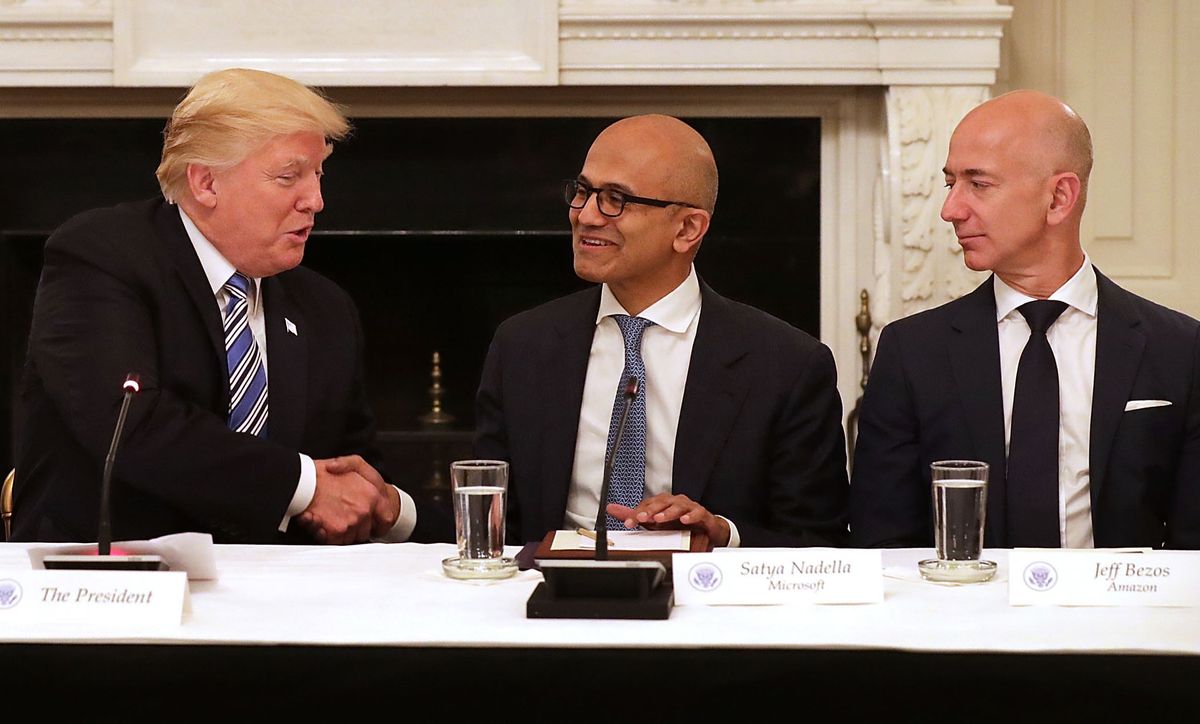What is JEDI, the government contract that has big tech going crazy?

A few minutes every morning is all you need.
Stay up to date on the world's Headlines and Human Stories. It's fun, it's factual, it's fluff-free.
The seemingly never-ending dispute over the Pentagon’s Joint Enterprise Defense Infrastructure (JEDI) cloud contract is no closer to ending, despite the Pentagon recently upholding its decision to award the contract to Microsoft Corp. in October 2019.
The saga of the JEDI contract is now in its third year and, with a process constantly undermined by claims of political bias and countless lawsuits, a swift resolution is not certain. However, what is apparent is how much is at stake for America’s big tech companies with this potentially 10-year government deal.
It’s been claimed that the winner of the contract would receive billions of dollars of future government work, as keeping the government’s software contracts firmly with one company minimizes the risk of security breaches.
So what exactly does this contract entail and why is big tech going so crazy over it?
Bidding wars
News of the Department of Defense’s JEDI contract first circulated in early 2018. With JEDI, the Pentagon was looking for a vendor to upgrade its existing cloud infrastructure and build new systems for the Department of Defense (DOD).
According to DOD spokesperson Heather Babb, the contract was “part of a much larger effort to modernize the Department’s information technology enterprise,” in other words, to keep the DOD competitive in a world of growing tech and cyber threats.
What was different about this process, however, was that the DOD was seeking to provide the contract – estimated to be worth some US$10 billion over a decade – to a sole vendor. According to Babb, this single-vendor approach “improves security, improves data accessibility and simplifies the Department’s ability to adopt and use cloud services.”
Rigged in favor of Amazon?
Safra Catz, Oracle’s chief executive officer (and former member of then-President-Elect Donald Trump’s 2016 transition team), met with the president for a private dinner in 2018. At the dinner, Catz complained that the procurement process for the JEDI contract was rigged in favor of Amazon.com Inc., whose Amazon Web Services remains the biggest cloud service provider on the market.
Microsoft, another company that was in the running for the contract, also expressed its displeasure at the single-vendor aspect of the process, arguing that the single-vendor approach cut the Pentagon off from innovation from other companies.
The complaints from Oracle Corp. and others resulted in the intervention of President Trump, who reportedly asked Defense Secretary Mark Esper to examine whether Amazon had an uncompetitive advantage in securing the contract.
Trump’s intervention generated claims that political bias was tainting the process, given the president’s well-known animosity toward Amazon CEO Jeff Bezos.
Government partners
At stake in the JEDI contract was not just a one-time opportunity to provide a government department with cloud services, but deeper ties and more profitable connections with the United States government as a whole.
For big tech, winning the 10-year JEDI contract would also open the door for the contract winner to secure other lucrative government deals.
This was the argument of commentators who saw Amazon as the likely winner of the JEDI contract, as the online retail giant had previously provided cloud systems to the Central Intelligence Agency (CIA) in 2014 in a multimillion-dollar deal.
Many tech companies have sought to establish themselves as preferred government partners and winning government contracts is seen as the best way to achieve this.
Palantir Technologies, the “big data” analytics company, is an example of one such company. Palantir has taken pride in its government connections – despite the significant controversy such connections have garnered – and has made public its hopes to become the “default operating system for data across the US government.”
The contract goes to …
Despite worries from rivals that Amazon was all but certain to secure the JEDI contract, in October 2019 the DOD announced Microsoft as the winner.
However, within a month of the DOD announcing Microsoft, Amazon made public its intention to fight the US government over the decision, with a spokesperson for Amazon highlighting what the company saw as “clear deficiencies, errors and unmistakable bias” that had dogged the contract awarding process.
Amazon consequently filed a lawsuit in a US federal court in November 2019, seeking to overturn the DOD’s decision to award Microsoft the contract.
The DOD refused to back down, releasing a statement arguing that all bidders were “treated fairly and evaluated consistently” throughout all stages of the process – this despite reports of President Trump personally intervening after complaints from Amazon’s rivals.
Oracle also continued to dispute the awarding process, but its appeals were again rejected in court in early September.
Amazon’s dispute has had somewhat more success. In February, a judge granted a temporary injunction halting Microsoft’s work on the JEDI contract as Amazon’s lawsuit continues in court.
Despite the injunction, the Pentagon upheld its decision to grant the contract to Microsoft, which again prompted Amazon to complain in a blog post that the decision had been “based on politics and improper influence and not based on the relative strengths of the two offerings.” The blog post stated that Amazon would continue in its legal battle against the US government.
As it stands, the US$10 billion JEDI contract remains, as Ron Miller of TechCrunch writes, “completely stuck,” with Amazon’s court case yet to be resolved and an injunction against any work by Microsoft halted until a resolution with Amazon is reached.
Have a tip or story? Get in touch with our reporters at tips@themilsource.com




Comments ()